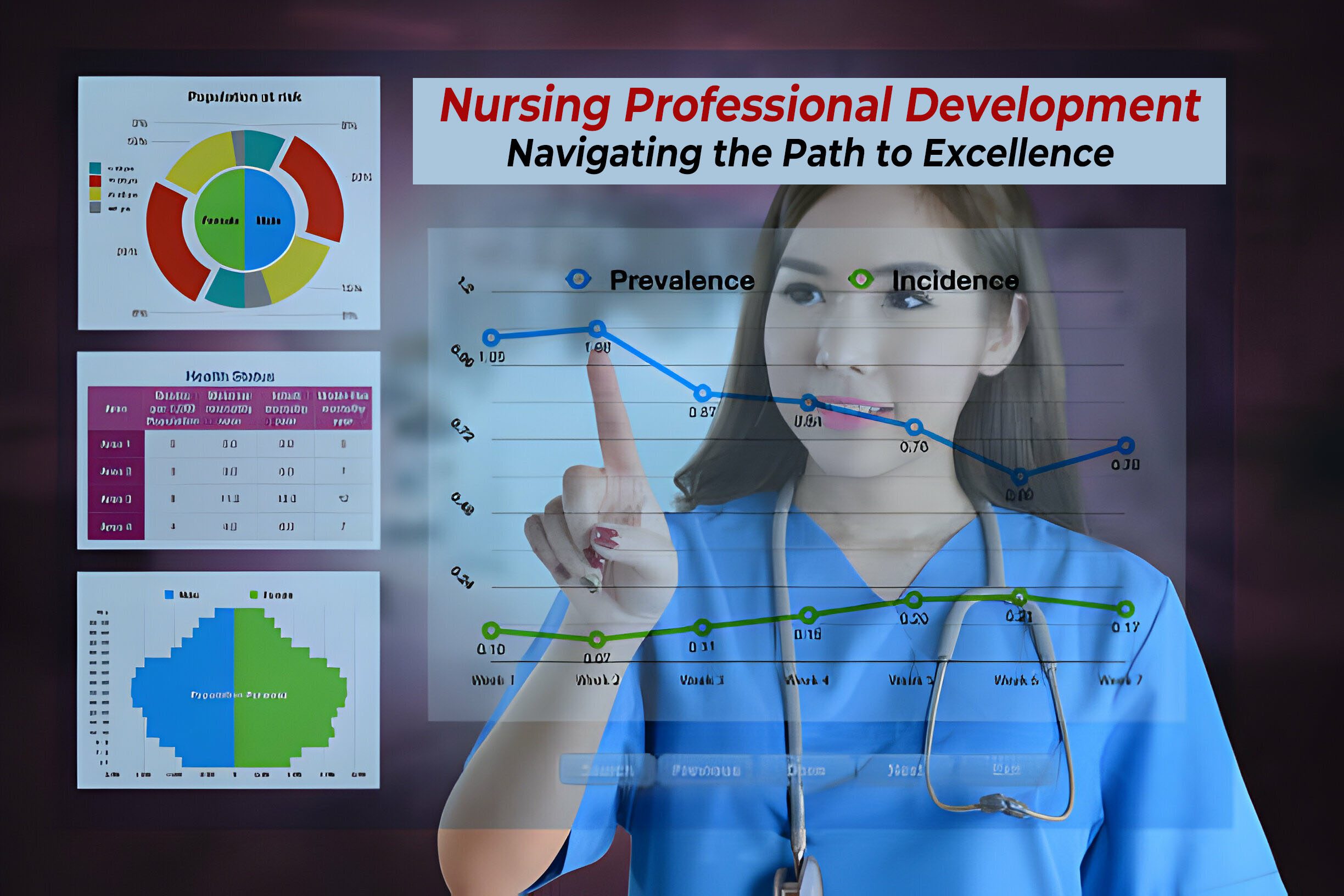Nursing Professional Development
Nursing, beyond a career, is a calling. As the healthcare landscape evolves, so does the role of nurses, making continuous professional development a cornerstone for success. In this exploration, we’ll unravel the layers of nursing professional development, delving into the essential trends, challenges, and strategies that shape the journey of these dedicated healthcare professionals.
Understanding the Dynamics of Nursing Professional Development
1: The Evolution of Nursing Practice
Nursing is no longer confined to bedside care. Explore how the profession has evolved, incorporating advanced technologies, evidence-based practices, and a broader scope of responsibilities.
2: The Role of Lifelong Learning in Nursing
Discover why the concept of lifelong learning is not just a recommendation but a necessity in the nursing profession. Uncover the impact of continuous education on patient outcomes and career advancement.
Challenges in Nursing Professional Development
3: Overcoming Staffing Shortages in Healthcare

Dive into the challenges posed by staffing shortages in the healthcare sector and how these impact the professional development of nurses. Explore innovative solutions and strategies to address this critical issue.
Administrative Responsibilities
4: Balancing Clinical and
Nurses often find themselves juggling clinical duties with administrative tasks. Examine the challenges of maintaining this delicate balance and strategies for effective time management and skill prioritization.
Trends Shaping Nursing Professional Development
5: Technological Integration in Nursing Practice
As technology becomes integral to healthcare, understand how nurses are embracing innovations. Explore the latest trends in healthcare technology and how they influence the skills required for nursing professionals.
6: Emphasis on Mental Health in Nursing
Recognize the growing importance of mental health awareness in healthcare settings. Explore how nursing professional development is adapting to address the mental health needs of both patients and professionals.
Strategies for Personal and Career Growth
7: Building a Personal Brand in Nursing
In the era of connectivity, nurses can leverage personal branding to enhance their professional reputation. Learn how to create a compelling personal brand that opens avenues for career growth and networking.
8: Mentorship and Networking in Nursing
Explore the significance of mentorship and networking in nursing professional development. Understand how building strong professional relationships can foster learning, collaboration, and career advancement.
Conclusion: Nurturing Excellence in Nursing Professional Development

In conclusion, the landscape of nursing professional development is multifaceted, demanding continuous adaptation and growth. As nurses navigate the complexities of evolving practices, embracing lifelong learning, overcoming challenges, and staying attuned to industry trends become the compass guiding them toward excellence.
Nursing Professional Development Goals: Navigating the Path to Excellence
Unlock your potential in nursing professional development goals. Explore strategies, challenges, and trends in this comprehensive guide. Enhance your career with informed insights.
Nursing Professional Development Goals: Introduction
Embarking on a journey in nursing requires a roadmap, a set of well-defined goals that guide and shape one’s professional development. In this exploration of nursing professional development goals, we delve into the intricacies of strategic planning, challenges faced, and trends shaping the landscape.
Setting the Course: Nursing Professional Development Goals
Nursing Professional Development Goals for Novice Nurses
Embarking on a nursing career? Discover the essential goals for novice nurses, from mastering fundamental clinical skills to building effective communication strategies. These early goals lay the foundation for a successful and fulfilling career.
Navigating Leadership Paths: Advancement Goals in Nursing
For experienced nurses eyeing leadership roles, the goals shift towards acquiring management skills, understanding healthcare policy, and fostering interdisciplinary collaboration. Explore the milestones that pave the way for leadership positions within the nursing hierarchy.
Overcoming Challenges in Nursing Professional Development
Addressing Staff Shortages: A Goal for Professional Resilience
In an era of healthcare challenges, nurses face staffing shortages. Explore how resilience becomes a critical goal, equipping nurses to navigate demanding work environments, ensure quality patient care, and advance their careers amid workforce constraints.
Work-Life Balance: An Imperative Goal for Long-Term Success
Maintaining a healthy work-life balance is more than a goal; it’s a necessity for nurses facing high-stress environments. Delve into strategies for achieving equilibrium, preventing burnout, and fostering longevity in a demanding profession.
Trends Shaping Nursing Professional Development Goals
Technological Proficiency: A Goal in the Digital Healthcare Landscape
Embracing technology is no longer an option but a goal for nurses. Discover how proficiency in healthcare technologies becomes a strategic goal, influencing patient care, data management, and communication within the modern healthcare ecosystem.
Cultural Competence: A Goal for Holistic Patient-Centered Care
In a diverse society, cultural competence is an evolving goal for nurses. Explore how this goal enhances patient care, fosters trust, and creates a healthcare environment that respects and incorporates diverse cultural perspectives.
Strategies for Achieving Nursing Professional Development Goals
Continuous Learning: The Cornerstone Goal for Nursing Excellence
Lifelong learning isn’t just a goal; it’s a mindset for nurses. Uncover the strategies for continuous learning, from pursuing advanced degrees to engaging in workshops and staying abreast of evidence-based practices.
Mentorship and Networking: Goals for Career Guidance
Mentorship and networking are strategic goals for nurses seeking guidance and career advancement. Learn how establishing meaningful connections and learning from experienced mentors can shape a nurse’s professional journey.
Conclusion: Nurturing Growth in Nursing Professional Development Goals
In conclusion, nursing professional development goals are the compass guiding nurses toward excellence. By setting strategic goals, overcoming challenges, and adapting to evolving trends, nurses can not only advance their careers but also contribute significantly to the ever-evolving landscape of healthcare.
Nursing Professional Development Practitioner: Paving the Way for Excellence
In the ever-evolving realm of healthcare, the role of a nursing professional development practitioner takes center stage. This article unveils the intricate landscape of this profession, exploring the key responsibilities, challenges, and strategies that shape the journey of those dedicated to enhancing the skills and knowledge of nursing professionals.
Understanding the Essence: Role and Responsibilities

1: The Vital Role of a Nursing Professional Development Practitioner
Delve into the fundamental responsibilities of these practitioners, bridging the gap between theory and practice, fostering a culture of continuous learning, and shaping the future of nursing.
2: Nurturing Competency in Nursing Skills
Explore how these practitioners play a pivotal role in developing and enhancing the clinical skills of nurses, ensuring they meet the ever-changing demands of patient care.
Challenges in the Path of a Nursing Professional Development Practitioner
3: Adapting to Technological Advancements
Examine the challenge of integrating technological advancements into nursing education and how practitioners navigate this dynamic landscape to keep professionals updated.
4: Overcoming Resistance to Change
Explore the resistance practitioners may encounter when introducing new methodologies or technologies and the strategies to foster a positive attitude towards change in the nursing community.
Strategies for Success in Nursing Professional Development
5: Tailoring Educational Programs to Diverse Learning Styles
Discover how practitioners customize educational programs to cater to diverse learning styles, ensuring that each nurse has the opportunity to thrive in their professional development journey.
6: Fostering a Culture of Lifelong Learning
Uncover the strategies employed by these practitioners to instill a culture of continuous learning, encouraging nurses to embrace lifelong learning as an integral part of their careers.
Navigating Interpersonal Dynamics
7: Effective Communication in Nursing Education
Explore the significance of effective communication skills for nursing professional development practitioners, both in conveying complex medical concepts and fostering a collaborative learning environment.
8: Building Collaborative Partnerships
Delve into the art of building partnerships with healthcare institutions, educators, and industry professionals to create comprehensive development programs that align with the evolving needs of nursing professionals.
The Impact of Nursing Professional Development Practitioners
9: Enhancing Patient Outcomes Through Educated Nurses
Highlight the direct correlation between the work of these practitioners and improved patient outcomes, emphasizing the crucial role of well-educated and skilled nurses in healthcare success.
10: Influencing Career Trajectories of Nursing Professionals
Examine how the guidance and mentorship provided by nursing professional development practitioners shape the career trajectories of individual nurses, contributing to their success and satisfaction.
Conclusion: Shaping the Future of Nursing Through Education
In conclusion, the role of a nursing professional development practitioner is multifaceted, requiring adaptability, effective communication, and a passion for nurturing the growth of nursing professionals. As these practitioners continue to pave the way for excellence, their impact on healthcare resonates far beyond the educational realm.
Nursing Professional Development Practitioner
A nursing professional development practitioner plays a crucial role in fostering the growth and advancement of nurses within the healthcare field. These practitioners are responsible for designing, implementing, and evaluating educational programs and initiatives that align with the evolving needs of nursing professionals.
They assess the skills and knowledge gaps within the nursing staff, develop targeted educational interventions, and facilitate learning opportunities.
Additionally, nursing professional development practitioners collaborate with healthcare leaders to ensure that educational strategies align with organizational goals and industry standards. They may also guide nurses in pursuing certifications, continuing education, and career advancement opportunities.
Through their expertise, these practitioners contribute to the ongoing improvement of nursing practice, promoting a culture of excellence and continuous learning within healthcare institutions.
Professional Development Nursing Examples
Professional development in nursing is essential for staying current in a dynamic healthcare landscape and ensuring optimal patient care. Nurses engage in ongoing education, certifications, and workshops to enhance their clinical skills and knowledge.
For instance, a nurse may pursue advanced certifications in areas such as critical care, neonatal nursing, or oncology to specialize in a particular field.
Additionally, attending conferences and seminars allows nurses to stay informed about the latest medical advancements, evidence-based practices, and healthcare policies.
Participation in professional organizations and collaborative initiatives also fosters networking and knowledge exchange, promoting a culture of continuous learning and improvement within the nursing profession.
Overall, these examples of professional development empower nurses to adapt to evolving healthcare challenges and provide high-quality, patient-centered care.
FAQs: Answering Your Nursing Professional Development Queries
How can novice nurses prioritize their professional development goals?
Prioritizing goals involves setting clear objectives, seeking mentorship, and consistently engaging in learning opportunities tailored to their career stage.
Is work-life balance achievable for nurses in high-stress environments?
Achieving work-life balance requires effective time management, self-care practices, and organizational support to mitigate the challenges posed by high-stress nursing environments.
Why is cultural competence essential as a nursing professional development goal?
Cultural competence ensures nurses can provide patient-centered care that respects diverse backgrounds, beliefs, and values, contributing to positive health outcomes.
What role does mentorship play in achieving nursing professional development goals?
Mentorship offers guidance, support, and opportunities for professional growth, making it a crucial component in achieving nursing professional development goals.
How does technological proficiency contribute to nursing excellence?
Technological proficiency enables nurses to leverage advancements for efficient patient care, data management, and communication, contributing to overall nursing excellence.
- How can nurses stay updated on the latest healthcare technologies?
- Nurses can attend workshops, webinars, and conferences focused on healthcare technology. Additionally, online courses and certifications can enhance their knowledge.
- What role does mentorship play in nursing professional development?
- Mentorship provides guidance, support, and a platform for knowledge exchange. Experienced mentors help novice nurses navigate challenges and plan their career trajectories.
- Is personal branding relevant for nurses?
- Absolutely. Personal branding allows nurses to showcase their expertise, build credibility, and stand out in a competitive healthcare environment.
- How can nurses address the mental health challenges they face in their profession?
- Open communication, seeking support from colleagues, and accessing mental health resources provided by healthcare institutions are vital steps in addressing mental health challenges.
- Are there specific online platforms for networking in the nursing profession?
- Yes, platforms like LinkedIn, specialized nursing forums, and professional association websites offer valuable networking opportunities for nurses.

I’m based in the USA, Canada, Australia, and the UK—four vibrant countries with rich educational landscapes and diverse news ecosystems.
Feel free to adjust and personalize this introduction to reflect your unique voice and experiences. Happy writing! 📝✨

